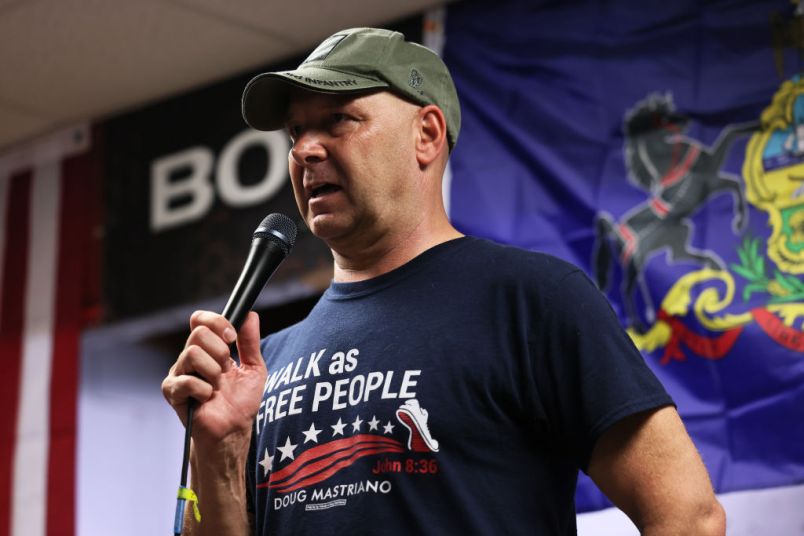Years before he helped fuel an insurrection at the Capitol, future Pennsylvania gubernatorial candidate Doug Mastriano (R) was writing dystopian fanfiction that warned of a “civilian putsch” that would arise if the military didn’t take a stand to uphold a culture of conservative ideology.
A master’s thesis Mastriano wrote in 2001 as a major at the Air Force’s Air Command and Staff College lays out in striking detail the now-gubernatorial candidate’s far-right vision of a military that must fight “political correctness” by staying rooted in conservatism.
Mastriano’s thesis is presented in the form of a fictional military leader’s personal journal in the year 2018, the year of “the destruction of the American Republic at the hands of a civilian led Putsch.”
Writing his account “by flickering candle light in a damp Virginian cave,” the military official describes how a dictator named Aurelius, backed by the EU and UN, was able to take power because the military had been weakened by civilian leaders’ push to make it an apolitical institution and impose political correctness upon it.
One example of this insidious undermining of the military’s foundation was allowing “the insertion of homosexuality,” according to the fictional official.
“The undermining the military’s culture occurred so slowly, that we really did not notice or understand it until was too late,” the fake official writes. “The result of this assault translated into no moral standards or absolutes (i.e. do what is right in your own eyes). Moral anarchy swept the ranks, which completely undermined the force as a whole.”
“The moral underpinnings of the US military were replaced by a neo-pagan worldview, transforming it into a docile social service institution unable to pose any of the imagined threats to the republic,” he continues. “Because of this transformation, the Putsch of 2018 succeeded.”
The thesis was flagged Friday by the Washington Post.
The ironies of Mastriano’s screed in context of his full-throated support of ex-President Donald Trump’s attacks on the 2020 election are not subtle; almost all the events the fictional military leader cited as the lead-up to the “putsch” could’ve been ripped from recent newspapers.
Additionally, the means through which the fictional dictator Aurelius shored up his power (putting political expediency over duty, demanding full loyalty to himself instead of the Constitution, purging officials who weren’t sufficiently loyal to him, etc.) mirror Trump’s actions to a T.
“Candor and honesty should not be suppressed because of some sort of misguided idea of unbridled loyalty,” the thesis observes. “Overly zealous commitment to ‘keep the boss happy’ is unhealthy to an organization and does nothing but promote careerism at the cost of the troops.”
Mastriano was, of course, witness to, if not a full participant in, a different sort of civilian putsch when he was present at the pro-Trump rally on Jan. 6 that came before a mob of Trump supporters stormed the Capitol.
But more significantly than just being at the rally, Mastriano helped Trump stoke the fury that led to the Capitol attack in the first place by lying about the 2020 election results being fraudulent and actively working to undo Joe Biden’s win.



